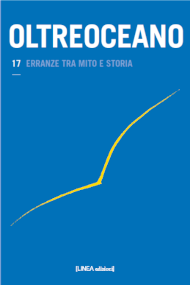Dalla campagna alla città, dall’Avana all’ampio mondo: le peregrinazioni di Reinaldo Arenas alla ricerca della Terra Promessa
DOI:
https://doi.org/10.53154/Oltreoceano12Keywords:
esilio, spazio, libertà, terra promessaAbstract
L’insofferenza verso ogni tipo di limitazione porta Reinaldo Arenas alla ricerca di spazi sempre più ampi, come se l’estensione territoriale fosse proporzionale al miglioramento del tenore di vita. Ma tutti i luoghi in cui vive – a Cuba e in esilio – sono sempre percepiti come limitati a causa della mancanza di reale democrazia. Il bisogno frustrato di emancipazione lo porta, pertanto,
a tradurre i concetti di libertà e di Terra promessa in un vagheggiato mito.
From the Countryside to the City, from Havana to the Wider World: Reinaldo Arenas’ Peregrinations in Search of the Promised Land
Intolerance of any type of restriction leads Reinaldo Arenas to search for ever wider spaces, almost as if the territorial extension were proportional to the improvement of lifestyle. Yet all the places where he has lived – in Cuba and in exile – are perceived as limited because of the lack of genuine democracy. The frustrated need for emancipation leads him, therefore, to translate the concepts of freedom and the promised Land into a longed-for myth.
Downloads
References
Arenas, R. (1967): Celestino antes del alba. La Habana: Unión.
Arenas, R. (1969): El mundo alucinante. México: Diógenes.
Arenas, R. (1983): Final de un cuento. Revista Mariel, 1,1, pp. 3-5.
Arenas, R. (1991): Final de un cuento. Huelva: Diputación Provincial de Huelva.
Arenas, R. (1992): Antes que anochezca. Barcelona: Tusquets.
Arenas, R. (1995): Adiós a mamá. De La Habana al cielo. Prólogo de M. Vargas Llosa. Barcelona: Altera.
Laín Corona, G. & Santiago Nogales, R. (Eds.) (2018): Cartografía literaria: en homenaje al profesor José Romera Castillo, I. Madrid: Visor.
Carta costituzionale americana del 28 luglio 1868. Recuperato da http://scienzepolitiche.uniroma2.it/files/2017/10/16.-Primi-dieci-emendamenti-alla-Costituzione-federale-USA-1.pdf
Chiesa, G. (1993): Il mito americano. Rumore, 2, pp 17-18. Recuperato da http://guidochiesa.net/testi/il-mito-americano-articolo.
Costanzo, S. (2008): La costruzione di un giallo sociale: Las cuatro estaciones di Leonardo Padura Fuentes. Messina: Lippolis.
Costanzo, S. (2017): Desterritorialización, lenguaje y frontera en Final de un cuento. Oltreoceano, 13, pp.77-86.
Cusato, D. A. (1995): El cuento se acabó (a propósito de Final de un cuento de Reinaldo Arenas). In R. Di Prisco & A. Scocozza (Eds.), Literatura y política en América Latina (pp. 341-363). Actas del congreso internacional (Salerno, 6-8 de mayo de 1993). Caracas: La Casa de Bello.
Cusato, D. A. (1996): Reinaldo Arenas: la vendetta della parola. En AISPI, Scrittori contro: modelli in discussione nelle letterature iberiche (pp. 347-358). Atti del Convegno di Roma, 15-16 marzo 1995. Roma: Bulzoni.
Cusato, D. A. (2018): El padre Mier y Reinaldo Arenas: destinos comunes en espacios y tiempos diferentes. In G. Lain Corona & R. Santiago Nogales (Eds.), Cartografía literaria: en homenaje al profesor José Romera Castillo, I (pp. 949-960). Madrid: Visor.
Dichiarazione d’Indipendenza Stati Uniti (1776). Recuperato da http://www.storiacontemporanea.eu/documenti/dichiarazione-dindipendenza-1776
Eco, U. (2015): Numero zero. Milano: Bompiani.
Padura Fuentes, L. (2005): La neblina del ayer. Barcelona: Tusquets.
Quesada, A. J., (2008): El portero de Reinaldo Arenas. Papel Literario. Revista Digital de Literatura y Crítica Literaria, 26-11. Recuperato da http://www.papel-literario.com/index.php?id=1213&tx_ttnews%5Btt_news%5D=8962&cHash=2a06cc34c2c0d12996678ca7b8cfb899
Rama, A. (1981): Reinaldo Arenas al ostracismo. Eco, 231, p. 332.
Vocabolario Treccani (2020): voce Erranza. Recuperato da http://www.treccani.it/vocabolario/ricerca/erranza/
Downloads
Published
How to Cite
Issue
Section
License

This work is licensed under a Creative Commons Attribution-NonCommercial-ShareAlike 4.0 International License.
The authors undertake to comply with the following conditions, which are considered accepted at the time of submission of their contributions.
The sending of a text implies that it is unpublished and not submitted to be published elsewhere.
1. If accepted, the author shall confer on the publisher the right to publish and distribute it both in paper form and in the online electronic edition. The published articles will be downloadable and made available in open access.
2. Provided that it correctly indicates that the first publication took place in the journal Oltreoceano. Rivista sulle migrazioni the author has the right to: a) reproduce the article in separate extracts or collected in a volume; b) publish the article on their personal website or teaching site provided that these sites are of a non-commercial nature; c) deposit the article in online archives of a non-commercial nature, linked to the institution they belong to or as part of projects for the non-commercial dissemination and open access of scientific works.
The use of contributions by third parties, for commercial or otherwise unauthorized purposes, is not allowed. The publisher declines all responsibility for the unauthorized use of the material published in the journal.












